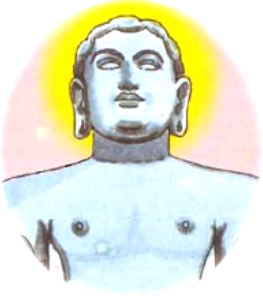- Books Name
- CBSE Class 6 Social Science Book
- Publication
- Param Publication
- Course
- CBSE Class 6
- Subject
- Social Science
* Jainism
Life of Mahavira

Vardhamana, popularly known as Mahavira, is generally regarded as the founder of jainism in India. According to the jains, Mahavira was the twenty fourth and the last Tirthankara (or saint with divine power of granting salvation to his disciples). Their first Tirthankara was Rishabhadeva and the twenty third Tirthankara was Parshvanath, the son of king Ashvasena of Benaras.
But it was Mahavira who is generally regarded as the real founder of jainism. About his early life, however, much information is not available. He was born in the 6th century B.C. at Kundagram, near Vaishali (in modern Bihar). His father's name was Siddhartha who was the head of his Kshatriya tribe, Janatrika. His mother, Trishla, was the sister of the famous lichchhavi chieftain, Chetaka, whose daughter was married to Bimbisara, the renowned king of Magadha. Thus, Vardhamana belonged to a high aristocratic family.
* Main Teachings of Jainism
What Mahavira taught formed the teachings of Jainism. These are the following :
Ahimsa – The first and foremost principle of Jainism was Ahimsa or non-injury to anyone. This principle was against the rising number of animal sacrifices in the yajnas.
Severe Penance and Self-Sacrifice – Jainism believed in curbing one's desires and impulses by undertaking severe penance. To die during penance was considered as a great virtue.
No Faith in Yajnas, Sacrifices and Ritualism – Jainism was a sort of revolt against the superiority of the Brahmans and their yajnas, sacrifices and useless rituals.
Worship of Twenty – Four Tirthankaras Instead of respecting the Brahmans and worshipping their gods, the jains began to worship their own Tirthankaras.
No Faith in God – Mahavira did not believe in the existence of God, the creator and preserver of the universe.
No Faith in the Caste – System jainism strikes a deadly blow at the caste-system and all sorts of class distinctions. It preaches the equality of human beings.
A jain Bhadrabahu founded the Digambara Sect.
Attainment of Salvation – The Jains like the Hindus believe that the chief aim of man is to attain salvation (Moksha) or freedom the cycles of birth and rebirth. This salvation can be achieved by following the three Jewels (or Triratnas) of right faith, right knowledge and right conduct.
Next life and the Karma Theory – The Jains too, like the Hindus and the Buddists, believe in next life and trasmigration of soul.

 Param Publication
Param Publication
